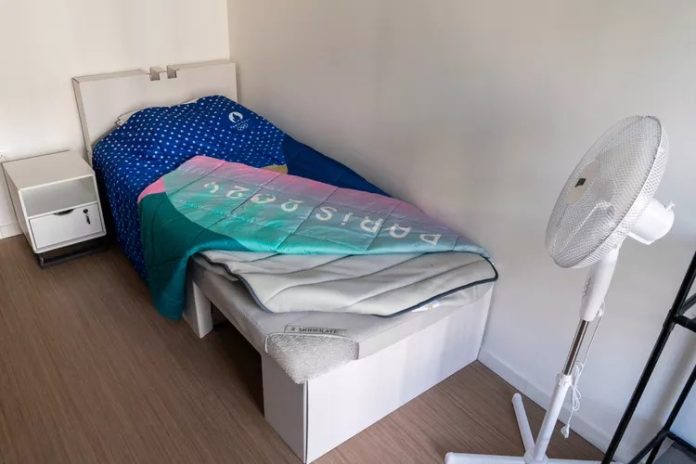Olympic diver Tom Daley has shown fans what the 2024 Paris Olympic Village cardboard beds really look like.
Before the prestigious athletic competition officially kicks off in a few days, the 30-year-old Olympian gave his TikTok followers a sneak peek at the polarizing cardboard beds in this year’s Olympic Village.
In a July 22 TikTok, Daley vouched for the eco-friendly furniture’s sturdiness, showing skeptical viewers evidence of its sound structure by knocking on the headboard and pulling at the bedpost.
“This is cardboard,” Tom explained to viewers. “Then you’ve got the mattress and then this cardboard with the mattress on top with a mattress topper. And then, we get our own Paris ’24 [comforter].”
“Rêvez vos exploits de demain,” the top of the bed reads, translating to “Dream about your achievements of tomorrow.”
The 30-year-old athlete showed viewers the cute detail as he jumped on the bed, adding: “As you can see, they’re pretty sturdy!”
However, the beds have been subject to scrutiny from athletes and viewers alike since they were introduced during the 2020 Olympics in Tokyo, as many Olympic athletes took to social media to show viewers that the beds were not only sturdy but comfortable as well.
“The bed in the video has since been recycled,” Israeli baseball player Ben Wanger said in a since-deleted TikTok video showing him and eight of his teammates jumping on a bed to disprove the viral rumor that the Olympic committee had chosen the cardboard sleeping set-ups to discourage sex among the athletes.
“We actually enjoy sleeping on these beds, and think they are a great and sustainable option for future Olympics.”
Olympic organizers stressed that they weren’t intended to be “anti-sex” beds, but instead symbolize the competition’s commitment to sustainability.
“We know the media has had a lot of fun with this story since Tokyo 2020,” Olympic organizers told Reuters in May. “But for Paris 2024, the choice of these beds for the Olympic & Paralympic Village is primarily linked to a wider ambition to ensure minimal environmental impact and a second life for all equipment used during the short period of the Games.”
Despite stressing that they weren’t created to curb the Olympic athletes’ sexual appetites, rumors of the after hours extracurriculars aren’t unfounded. In the past, Olympians like figure skater Kristi Yamaguchi, 53, have openly acknowledged the effects the competition has on athletes, especially in terms of the goings on in the Olympic village.
“The Olympics is an incredible experience,” the gold medalist explained to E! News earlier this year. “All around you, you’re meeting so many incredible idols and people you look up to. I think people, of course, after they finish competing, are enjoying themselves.”
Host countries began distributing condoms to athletes starting with France in 1992 during the Winter Olympics in Albertville.
According to Sky News, an estimated 150,000 condoms were handed out at the Tokyo Games, and with pandemic-era restrictions being lifted for the Paris games, a reported 300,000 condoms will be available this year.


